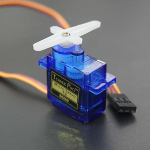 Servo motors are essential components in many modern machines and systems, playing a crucial role in applications requiring precise control of angular or linear position, velocity, and acceleration. This guide aims to provide potential buyers with comprehensive insights into servo motors buyers, their types, applications, and key factors to consider when making a purchase.
Servo motors are essential components in many modern machines and systems, playing a crucial role in applications requiring precise control of angular or linear position, velocity, and acceleration. This guide aims to provide potential buyers with comprehensive insights into servo motors buyers, their types, applications, and key factors to consider when making a purchase.
What is a Servo Motor?
A servo motor is a rotary actuator or linear actuator that allows for precise control of angular or linear position, velocity, and acceleration. It consists of a suitable motor coupled to a sensor for position feedback. It also requires a relatively sophisticated controller, often a dedicated module designed specifically for use with servo motors.
Types of Servo Motors
-
DC Servo Motors: These are powered by direct current (DC). They are commonly used due to their simple design and control, as well as their cost-effectiveness. DC servo motors are often found in smaller applications like RC vehicles and robotics.
-
AC Servo Motors: These are powered by alternating current (AC). AC servo motors are typically more powerful and efficient than their DC counterparts and are used in industrial applications where higher torque and precision are required.
-
Positional Rotation Servo Motor: This type of servo motor rotates the output shaft in a fixed angle, typically between 0 and 180 degrees. These are widely used in applications requiring controlled motion over a limited range, such as in model airplanes, cars, and robotics.
-
Continuous Rotation Servo Motor: Unlike positional rotation servos, continuous rotation servos can rotate continuously in either direction. They are used in applications where continuous motion is required, such as conveyor belts or wheels on mobile robots.
-
Linear Servo Motor: Instead of providing rotational motion, linear servo motors offer linear motion. These are used in applications where straight-line movement is needed, such as in CNC machines and automated manufacturing systems.
Applications of Servo Motors
Servo motors are utilized in a variety of industries and applications due to their precision and reliability. Some common applications include:
- Robotics: Servo motors are used to control the movement of robotic arms and legs, allowing for precise positioning and movement.
- Aerospace: In aircraft, servo motors control the movement of flaps and landing gear.
- Industrial Automation: They are integral in CNC machines, conveyor belts, and automated manufacturing systems, where precision and repeatability are critical.
- Automotive: Servo motors are used in modern vehicles for applications such as power windows, mirrors, and seats.
- Consumer Electronics: Devices like cameras and DVD players use servo motors to control the position of lenses and discs.
Key Considerations for Buying Servo Motors
When selecting a servo motor for a specific application, several factors need to be considered:
-
Torque: Determine the amount of torque required for your application. Torque is a measure of the force that causes an object to rotate. Ensure the servo motor can provide sufficient torque to handle the load.
-
Speed: Consider the speed at which the servo motor needs to operate. This is typically measured in RPM (revolutions per minute). Different applications require different speeds, so choose a motor that matches your requirements.
-
Precision: Assess the level of precision needed. High-precision applications require servo motors with fine control over position and movement.
-
Power Supply: Check the power requirements of the servo motor. Ensure that your power supply can meet the voltage and current demands of the motor.
-
Size and Weight: The physical size and weight of the servo motor may be important, especially in applications with limited space or weight constraints.
-
Feedback Mechanism: Servo motors rely on feedback to achieve precise control. The type of feedback (e.g., potentiometer, encoder) can affect the performance and suitability of the motor for your application.
-
Durability and Reliability: Consider the environment in which the servo motor will operate. Choose a motor that can withstand the conditions, whether it’s high temperatures, dust, moisture, or vibrations.
-
Control System Compatibility: Ensure that the servo motor is compatible with your control system. Check the communication protocols and interfaces.
-
Cost: Balance your budget with the performance requirements. Higher-end servo motors with advanced features may come at a higher cost, so prioritize features based on your needs.
Popular Brands and Manufacturers
Several reputable brands and manufacturers produce high-quality servo motors. Some of the well-known names in the industry include:
- Mitsubishi Electric: Known for their reliable and high-performance servo motors suitable for industrial applications.
- Yaskawa: Offers a wide range of servo motors with excellent precision and control, popular in robotics and automation.
- FANUC: A leading manufacturer in industrial automation, FANUC produces servo motors known for their durability and efficiency.
- Siemens: Provides a variety of servo motors designed for high-performance applications in various industries.
- Panasonic: Offers servo motors that are compact, efficient, and suitable for a range of applications, including robotics and manufacturing.
Conclusion
Selecting the right servo motor involves careful consideration of various factors including torque, speed, precision, power supply, size, and feedback mechanisms. By understanding the specific requirements of your application and the characteristics of different types of servo motors, you can make an informed decision that ensures optimal performance and reliability.
Whether you are working on a robotics project, industrial automation, or any other application requiring precise motion control, the right servo motor can make a significant difference in the success and efficiency of your system. Investing time in researching and choosing the appropriate servo motor will pay off in the long run with improved performance and reduced downtime.
